Hãy nhập câu hỏi của bạn vào đây, nếu là tài khoản VIP, bạn sẽ được ưu tiên trả lời.

|2x| = x - 6
|2x| = x - 6 ⇔ 2x = x - 6 khi x ≥ 0 ⇔ x = -6 loại vì không thoả mãn x ≥ 0
|2x| = x - 6 ⇔ -2x = x - 6 khi x < 0 ⇔ 3x = 6 ⇔ x = 2 loại vì không thoả mãn x < 0
Vậy phương trình vô nghiệm.

a)(2x+1)(3x-2)=(5x-8)(2x+1)
⇔(2x+1)(3x-2)-(5x-8)(2x+1)=0
⇔(2x+1)(3x-2-5x+8)=0
⇔(2x+1)(-2x+6)=0
⇔2x+1=0 hoặc -2x+6=0
1.2x+1=0⇔2x=-1⇔x=-1/2
2.-2x+6=0⇔-2x=-6⇔x=3
phương trình có 2 nghiệm x=-1/2 và x=3

a) (x-1)(5x+3)=(3x-8)(x-1)
= (x-1)(5x+3)-(3x-8)(x-1)=0
=(x-1)[(5x+3)-(3x-8)]=0
=(x-1)(5x+3-3x+8)=0
=(x-1)(2x+11)=0
\(\Leftrightarrow\) x-1=0 hoặc 2x+11=0
\(\Leftrightarrow\) x=1 hoặc x=\(\dfrac{-11}{2}\)
Vậy S={1;\(\dfrac{-11}{2}\)}
b) 3x(25x+15)-35(5x+3)=0
=3x.5(5x+3)-35(5x+3)=0
=15x(5x+3)-35(5x+3)=0
=(5x+3)(15x-35)=0
\(\Leftrightarrow\) 5x+3=0 hoặc 15x-35=0
\(\Leftrightarrow\) x=\(\dfrac{-3}{5}\) hoặc x=\(\dfrac{7}{3}\)
Vậy S={\(\dfrac{-3}{5};\dfrac{7}{3}\)}
c) (2-3x)(x+11)=(3x-2)(2-5x)
=(2-3x)(x+11)-(3x-2)(2-5x)=0
=(3x-2)[(x+11)-(2-5x)]=0
=(3x-2)(x+11-2+5x)=0
=(3x-2)(6x+9)=0
\(\Leftrightarrow\) 3x-2=0 hoặc 6x+9=0
\(\Leftrightarrow\) x=\(\dfrac{2}{3}\) hoặc x=\(\dfrac{-3}{2}\)
Vậy S={\(\dfrac{2}{3};\dfrac{-3}{2}\)}
d) (2x2+1)(4x-3)=(2x2+1)(x-12)
=(2x2+1)(4x-3)-(2x2+1)(x-12)=0
=(2x2+1)[(4x-3)-(x-12)=0
=(2x2+1)(4x-3-x+12)=0
=(2x2+1)(3x+9)=0
\(\Leftrightarrow\)2x2+1=0 hoặc 3x+9=0
\(\Leftrightarrow\)x=\(\dfrac{1}{2}\)hoặc x=\(\dfrac{-1}{2}\) hoặc x=-3
Vậy S={\(\dfrac{1}{2};\dfrac{-1}{2};-3\)}
e) (2x-1)2+(2-x)(2x-1)=0
=(2x-1)[(2x-1)+(2-x)=0
=(2x-1)(2x-1+2-x)=0
=(2x-1)(x+1)=0
\(\Leftrightarrow\) 2x-1=0 hoặc x+1=0
\(\Leftrightarrow\) x=\(\dfrac{-1}{2}\) hoặc x=-1
Vậy S={\(\dfrac{-1}{2}\);-1}
f)(x+2)(3-4x)=x2+4x+4
=(x+2)(3-4x)=(x+2)2
=(x+2)(3-4x)-(x+2)2=0
=(x+2)[(3-4x)-(x+2)]=0
=(x+2)(3-4x-x-2)=0
=(x+2)(-5x+1)=0
\(\Leftrightarrow\) x+2=0 hoặc -5x+1=0
\(\Leftrightarrow\) x=-2 hoặc x=\(\dfrac{1}{5}\)
Vậy S={-2;\(\dfrac{1}{5}\)}

e sẽ cố gắng !!!
\(3x-15=2x\left(x-5\right)\)
\(3x-15=2x^2-10x\)
\(3x-15-2x^2+10x=0\)
\(13x-15-2x^2=0\)
\(x\left(13-2x\right)-15=0\)
\(\Rightarrow\orbr{\begin{cases}x=0\\13-2x-15=0\end{cases}\Rightarrow\orbr{\begin{cases}x=0\\-2-2x=0\end{cases}\Rightarrow}\orbr{\begin{cases}x=0\\2x=-2\end{cases}\Rightarrow}\orbr{\begin{cases}x=0\\x=-1\end{cases}}}\)
\(f,x\left(2x-7\right)-4x+14=0\)
\(2x^2-7x-4x+14=0\)
\(2x^2-11x+14=0\)
\(x\left(2x-11\right)=-14\)
\(\Rightarrow\orbr{\begin{cases}x=-14\\2x-11=-14\end{cases}\Rightarrow\orbr{\begin{cases}x=-14\\2x=-3\end{cases}\Rightarrow}\orbr{\begin{cases}x=-14\\x=-\frac{3}{2}\end{cases}}}\)

a) 0,75x(x + 5) = (x + 5)(3 - 1,25x)
<=> 0,75x(x + 5) - (x + 5)(3 - 1,25x) = (x + 5)(3 - 1,25x) - (x + 5)(3 - 1,25x)
<=> 0,75x(x + 5) - (x + 5)(3 - 1,25x) = 0
<=> (x + 5)(0,75 + 1,25x - 3) = 0
<=> (x + 5)(2x - 3) = 0
<=> x + 5 = 0 hoặc 2x - 3 = 0
<=> x = -5 hoặc x = 3/2
b) 4/5 - 3 = 1/5x(4x - 15)
<=> -11/5 = x(4x - 15)/5
<=> -11 = x(4x - 15)
<=> -11 = 4x2 - 15x
<=> 11 + 4x2 - 15x = 0
<=> 4x2 - 4x - 11x + 11 = 0
<=> 4x(x - 1) - 11(x - 1) = 0
<=> (4x - 11)(x - 1) = 0
<=> 4x - 11 = 0 hoặc x - 1 = 0
<=> x = 11/4 hoặc x = 1
c) \(\left(x-3\right)-\frac{\left(x-3\right)\left(2x-5\right)}{6}=\frac{\left(x-3\right)\left(3-x\right)}{4}\)
<=> 12x - 36 - 2(x - 3)(2x - 5) = 3(x - 3)(3 - x)
<=> 12x - 36 - 4x2 + 10x + 12x - 30 = 9x - 3x2 - 27 + 9x
<=> 34x - 66 - 4x2 = 18x - 3x2 - 27
<=> 34x - 66 - 4x2 - 18x + 3x2 + 27 = 0
<=> 16x - 39x - x2 = 0
<=> x2 - 16x + 39x = 0
<=> (x - 3)(x - 13) = 0
<=> x - 3 = 0 hoặc x - 13 = 0
<=> x = 3 hoặc x = 13
d) \(\frac{\left(3x+1\right)\left(3x-2\right)}{3}+5\left(3x+1\right)=\frac{2\left(2x+1\right)\left(3x+1\right)}{3}+2x\left(3x+1\right)\)
<=> (3x + 1)(3x - 2) + 15(3x + 1) = 2(2x + 1)(3x + 1) + 6x(3x + 1)
<=> 9x2 - 6x + 3x - 2 + 45x + 15 = 12x3 + 4x + 6x + 2 + 18x2 + 6x
<=> 9x2 + 42x + 13 = 30x2 + 16x + 2
<=> 9x2 + 42x + 13 - 30x2 - 16x - 2 = 0
<=> -21x2 + 26x + 11 = 0
<=> 21x2 - 26x - 11 = 0
<=> 21x2 + 7x - 33x - 11 = 0
<=> 7x(3x + 1) - 11(3x + 1) = 0
<=> (7x - 11)(3x + 1) = 0
<=> 7x - 11 = 0 hoặc 3x + 1 = 0
<=> x = 11/7 hoặc x = -1/3

chẳng ai giải, thôi mình giải vậy!
a) Đặt \(y=x^2+4x+8\),phương trình có dạng:
\(t^2+3x\cdot t+2x^2=0\)
\(\Leftrightarrow t^2+xt+2xt+2x^2=0\)
\(\Leftrightarrow t\left(t+x\right)+2x\left(t+x\right)=0\)
\(\Leftrightarrow\left(2x+t\right)\left(t+x\right)=0\)
\(\Leftrightarrow\left(2x+x^2+4x+8\right)\left(x^2+4x+8+x\right)=0\)
\(\Leftrightarrow\orbr{\begin{cases}x=-2\\x=-4\end{cases}}\)vậy tập nghiệm của phương trình là:S={-2;-4}
b) nhân 2 vế của phương trình với 12 ta được:
\(\left(6x+7\right)^2\left(6x+8\right)\left(6x+6\right)=72\)
Đặt y=6x+7, ta được:\(y^2\left(y+1\right)\left(y-1\right)=72\)
giải tiếp ra ta sẽ được S={-2/3;-5/3}
c) \(\left(x-2\right)^4+\left(x-6\right)^4=82\)
S={3;5}
d)s={1}
e) S={1;-2;-1/2}
f) phương trình vô nghiệm

a)|3x| = x + 8 ⇔[3x=x+8;x≥0−3x=x+8;x<0[3x=x+8;x≥0−3x=x+8;x<0
⇔[2x=8−4x=8[2x=8−4x=8
⇔[x=4;x=−2;[x=4;x=−2;
x = 4 thỏa mãn ĐK x ≥ 0 và x = -2 thỏa mãn ĐK x < 0
Vậy tập hợp nghiệm S = {4;-2}
b)|-2x| = 4x + 18 vì |-2x| = |2x| ⇔ |2x| = 4x +18
⇔ [2x=4x+18;x≥0−2x=4x+18;x<0⇔[−2x=18−6x=18[2x=4x+18;x≥0−2x=4x+18;x<0⇔[−2x=18−6x=18
⇔[x=−9;x=−3[x=−9;x=−3
x = -9 không thỏa mãn ĐK x ≥ 0
Vậy phương trình có tập nghiệm S = {-3}
c)|x – 5| = 3x ⇔[x−5=3x;x≥5−x+5=3x;x<5[x−5=3x;x≥5−x+5=3x;x<5
⇔[−5=2x5=4x[−5=2x5=4x
⇔[x=−52x=54[x=−52x=54
x=−52x=−52 không thỏa mãn ĐK x ≥ 5
Vậy tập hợp nghiệm của phương trình S={54}S={54}
d) |x + 2| = 2x – 10.
⇔[x+2=2x−10;x≥−2−x−2=2x−10;x<−2[x+2=2x−10;x≥−2−x−2=2x−10;x<−2
⇔[x=12x=83[x=12x=83
x=83x=83 không thỏa mãn điều kiện x < -2
Vậy tập hợp nghiệm của phương trình S ={12 }
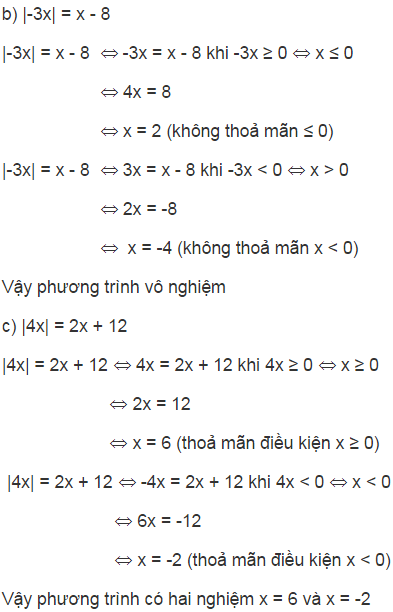
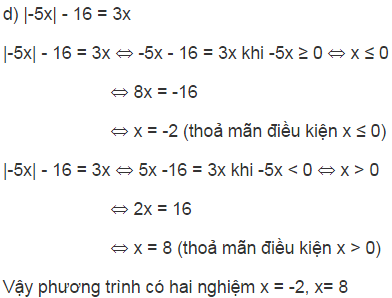
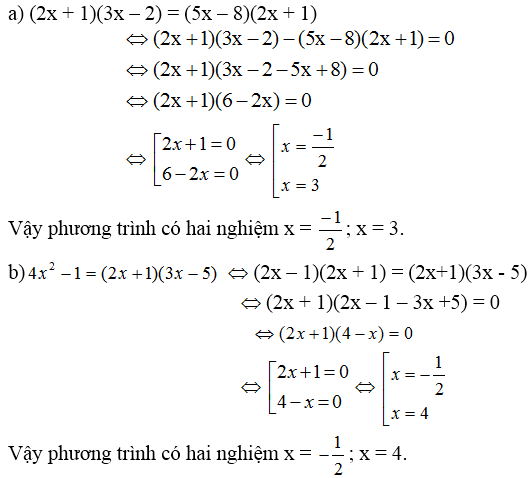
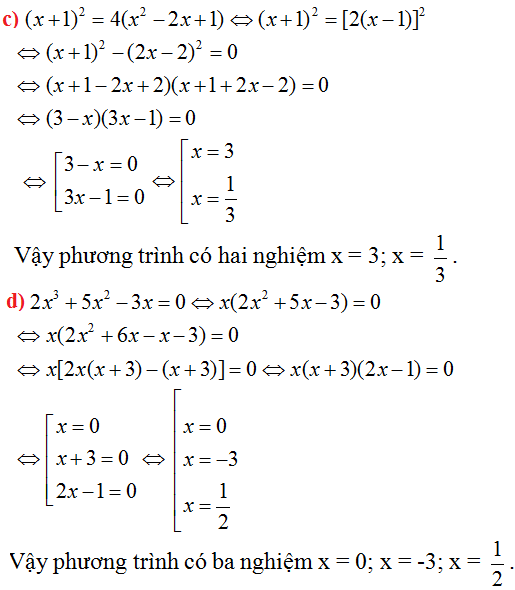
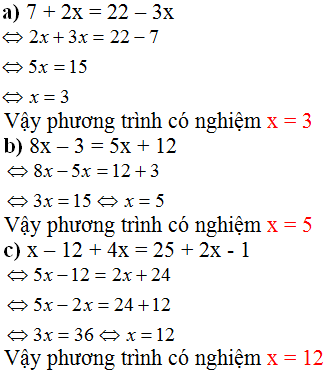
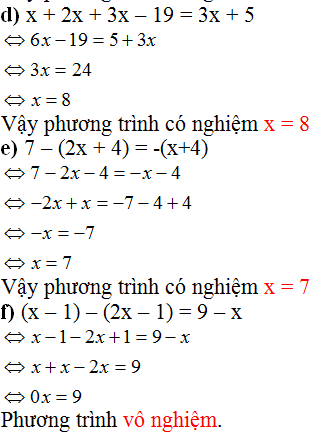
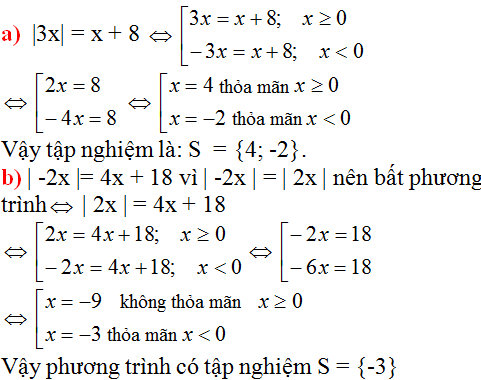
\(a,\left|2x\right|=x-6\)
\(\Leftrightarrow2x=x-6\)
\(\Leftrightarrow2x-x=-6\)
\(\Leftrightarrow x=-6\)
____________________
\(b,\left|-3x\right|=x-8\)
\(\Leftrightarrow3x=x-8\)
\(\Leftrightarrow3x-x=-8\)
\(\Leftrightarrow2x=-8\)
\(\Leftrightarrow x=-4\)
____________________
\(c,\left|4x\right|=2x+12\)
\(\Leftrightarrow4x=2x+12\)
\(\Leftrightarrow4x-2x=12\)
\(\Leftrightarrow2x=12\)
\(\Leftrightarrow x=6\)
____________________
\(d,\left|-5x\right|-16=3x\)
\(\Leftrightarrow5x-16=3x\)
\(\Leftrightarrow5x-3x=16\)
\(\Leftrightarrow2x=16\)
\(\Leftrightarrow x=8\)
tks